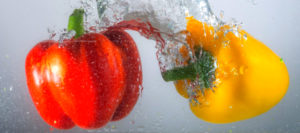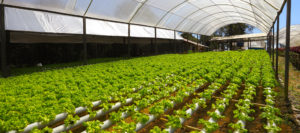We present 5 reasons why it is important to lower the EC and eliminate the chlorine from the water with which you irrigate your plants.
Why should we eliminate chlorine from water?
Horticulture is an inherent human activity that allows us to evolve and survive as a species. From thousands of years of experience, starting life from all types of soils, we have to add the enormous advances and developments that have been introduced in the last 20 years, all which have allowed us to optimize the quality of what we grow. One fundamental part of what we’ve learned is our comprehension of the importance of the quality of water and how components such as EC (electro-conductivity) and chlorine can affect our crops.

No grower, from the most traditional to the most technical, forgets the importance that water has on their plants. We need to keep in mind that water not only has the most weight in our plants, but it’s also the main medium through which we can introduce, inadvertently, foreign substances that can weaken our plants and lower the quality and quantity of our yields. Even basics like taste and nutritional value of fruits can be changed.
What are you giving your plants to drink?
When you water your plants with regular tap water, there’s also a series of chemicals, depending on your region, that can be introduced in varying concentrations. In areas of hard water, there can be an abundance of calcium, magnesium, lime scale, potassium and sulfates. These salts will increase the electro-conductivity (EC). In areas with soft water, though there won’t be excessive salts, you will almost always find the presence of chlorine.
Why should we lower the EC and eliminate chlorine from our water?
The following are 5 reasons why it is important to lower the EC and eliminate chlorine from the water we use for our plants and gardens.
- Higher quantity of nutrients and higher nutritional efficiency. The electro-conductivity (EC) measurement gives us a good estimate of the quantity of dissolved salts in the water. Each plant can only take in a limited concentration of salts, in EC value of between 1,4 and 2,2 ms/cm, depending on the type and phase of development. This is due to their roots capacity for absorption. If we start by giving our plants a water with 1,0 ms/cm, then the quantity of nutrients we can thereby safely give them is only 0,4 to 1,2 ms/cm, as the maximum. On the other hand, if we start with a water with very low EC, then we can give our plants a greatly superior quantity of nutrients. Also, if we give our plants a pure water to start, then they will not inadvertently absorb undesirable elements (chemicals), which of course will allow us to achieve 100% efficiency in the nutrients and fertilizers we administer.
- By lower the EC we maintain a much healthier root system. Hard waters contain a high concentration of mineral salts that can produce lime scale and incrust and block plants roots, reducing their capacity of absorption and affecting the nutrition of the plants. In fact, these mineral salts, such as lime scale, sodium and magnesium among others, together with the nutrients that we add to our plants, can cause a saturation of the roots and an effect known as “nutrient lock out”. This effect is the incapacity of the plant to continue to absorb any more nutrients, which of course can kill the plants, if not remedied. By reducing the EC of the water we can improve the health of our plants roots, by avoiding obstruction of the root system and avoiding “nutrient lockout”. The root system will be able to absorb the necessary nutrients with maximum efficiency.
- Protection of microorganisms in soils and extracts. Most organic soils contain beneficial microorganisms that collaborate in a plants health, maintaining clean roots systems so that they can use their complete capacity of absorption for nutrition or in the case of mycorrhiza, even increase the capacity. These microorganisms also protect plants against invasions molds and pathogens. When we use regular tap water for our plants, we are killing off these beneficial microorganisms. The reason; Chlorine. Chlorine is a chemical disinfectant used by municipalities to guarantee potable water, by killing off any bacterias that may be present, while also impeding the proliferation of algae or mushrooms inside of the distribution pipes and storage tanks. But chlorine isn’t selective, and as a disinfectant it eliminates all microorganisms, even the beneficial ones. So, this is another reason why we should never use water straight from the tap, especially if we cultivate with beneficial microorganisms or bio-fertilizers.
- Greater general growing control, less problems. By lowering the EC in our water we achieve a greater total control in our cultivation methods. For example, with a lower concentration of salts we’ll have a more balanced pH, optimal for our plants. Also, with a purer water, we will be able to detect the origen of any problems that arise with more precisión, since we will already have eliminated a series of unknown variables that come with water straight from the tap. We’ll know exactly what type and what quantity of nutrients our plants are receiving.
- Higher quality production and yield for our gardens. By reducing the EC and eliminating chlorine we’ll have a higher quality and larger yield in our plants. When you think about, watering your plants with water that has unknown composition, you are incorporating an unknown quantity of substances, that will end up in your plants, fruits and vegetables. In general, you are affecting the quality of your product; it’s taste, aroma and nutritional value, while also reducing the quantity of your yield. Your plants should be able to take 100% advantage of the nutrients that you supply, without having to worry about the additional components of a high EC water. Your plants should be able to benefit from the good microorganisms that you add to them, without adding chlorinated water that will kill them off.

In summary, good water quality is the foundation on which a great harvest is built. Quality water is fundamental and has direct effects upon the health and quality of your plants and the yield in your gardens. When you water your plants, you need to ask yourself; What am I really giving them? Is it a water that I would like to drink myself? If not, what can I do about it?


